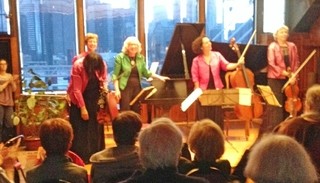|
Back
Romance on a Sunday Afternoon New York
Barge Music
09/27/2015 -
Masterworks Series:
Clara Schumann: Romance variée, Op. 3
Felix Mendelssohn: String Quartet No. 2 in A minor, Op. 13
Robert Schumann: Piano Quintet in E-flat Major Op. 44
Ursula Oppens (Piano), Cassatt Quartet: Muneko Otani, Jennifer Leshnower (Violins), Sarah Adams (Viola), Elizabeth Anderson (Cello)

U. Oppens (in green), Cassatt Quartet (© Sam von Dogenstein)
Mme Schumann would have been proud. Not only was one of her early piano works played by one of the world’s great pianists, but her husband’s great Quintet and his friend Mendelssohn’s fascinating Second Quartet were also being played. And by a quintet of established female musicians.
True, one shouldn’t even have to mention the gender at BargeMusic yesterday afternoon. Yet the rarity of the personnel together was indeed an occasion. Especially since the five artists were playing against musical type.
Ursula Oppens is famed for her performance by living composers. Her friendship with Elliott Carter could be compared to Joachim’s friendship with Brahms. Her performances of Rzewski, Nancarrow, Ligeti, Cage, Wuorinen and countless others have made her an icon with audiences.
The Cassett Quartet, after 30 years together, has an image more eclectic, but composers like Stephen Stucky and Sebastian Currier have written for them, and they regularly attend contemporary festivals.
And here they were, under the Brooklyn Bridge on a Sunday afternoon playing that most elegant Classical composer who posed as a Romantic, Felix Mendelssohn. As well as 13-year-old Clara Schumann (actually infatuated at that age by Robert). And a Piano Quintet by Robert himself, a composer who was at the heart of the Romantic movement?
To be honest, I gave up my Sunday purely to hear Ms. Oppens, who is a force of nature no matter what she plays. Yes, I would prefer to have heard her play the Carter Piano Quartet than a ditty from the young Clara. But so intense is her musicality that even something called Variations on a Romance would be intriguing.
While new to me, the piece smacked at first of something Jane Austen might have been played. But the variations, under Ms. Oppens’s hands, suddenly took off. The ten-odd variations were suddenly dazzling with flourishes, decorations and even cadenzas coming from the piano. One could well understand how Robert, with his limited piano abilities, would have been impressed.
The Mendelssohn Second Quartet is one of the least expected works of the composer. I had heard it many years ago and paid little attention. This time, under the Cassatt Quartet, it was actually a revelation. Not the first movement (even with its touching introduction), but a second-movement Adagio non lento that transformed itself far from the usually fastidious Mendelssohn canon.
Was this Mendelssohn? Or was it late, eccentric Beethoven? The strange solos by violinist Muneko Otani, and cellist Elizabeth Andersen going into faraway keys were both intriguing. The Cassatt Quartet took this work through outlandish (for Mendelssohn) harmonies, contrapuntal conniptions that came from a terra incognita of the composer. It was less an homage to Beethoven as much as hearing the grouchy old composer (who had recently died) taking over the brain of the fastidious dandy.
The third movement was typically folkish–but was I wrong in thinking this was a Russian folk song? Almost like a tune out of the Razumovsky quartets.
The finale was one more ear-opener. The Cassatt Quartet had the lightness of touch for a typical Presto. That Presto, though, was like a magic command for a deep, dark funereal ending, the cello holding together lines that stem from the deepest most enigmatic Beethoven.
Would I rather hear Opus 132 instead of an Opus 13 from a nineteen-year-old? Of course. Yet the fact that Mendelssohn had such feelings (and would later revive Baroque masters) shows that, had he lived longer, he might have transcended his easy-going virtuosity.
Ms. Oppens returned for a most familiar work, the Schumann Quintet. So familiar, that the piece can sometimes seem stodgy, especially on recordings. For this most live performance, the group almost brashly started, and continued for almost 30 minutes.
This was a tight-knit performance, One never had the illusion of improvisation, alas, but that was assuaged by a meticulous intonation, precise balance between piano and string, and a striking joy in performance.
Were the tempos faster than usual? Difficult to tell, because both Ms. Oppens and the Cassatt Quartet played with both heart and sometimes searing energy.
Harry Rolnick
|